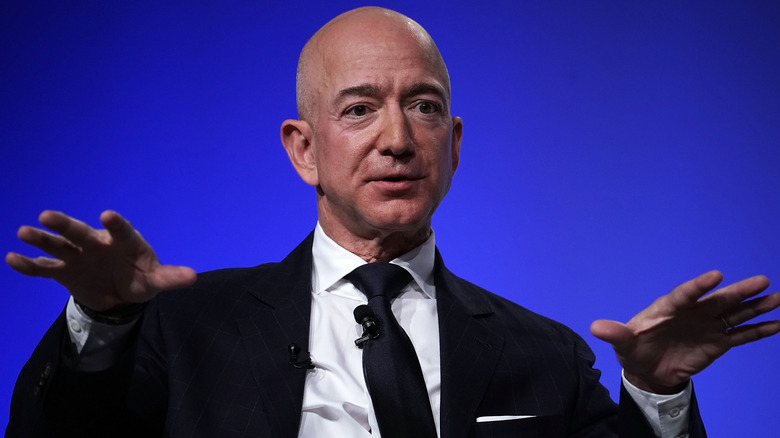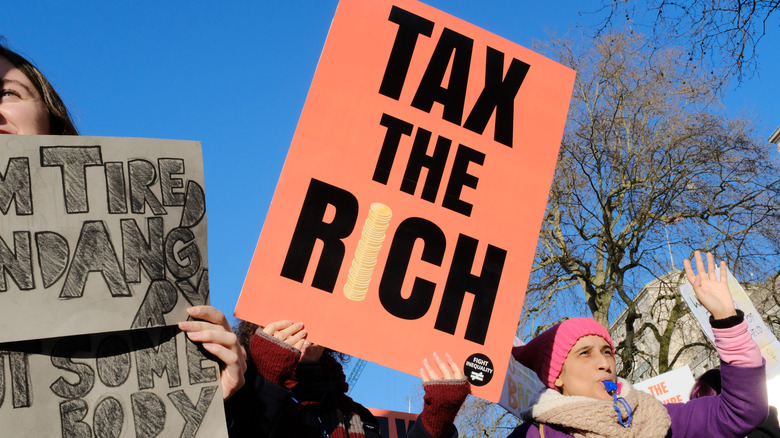The Sneaky Reason Why Jeff Bezos' Salary Is So Low
Alongside efforts like sustainability(such as offering eco-friendly products) and increased transparency, consumers are also increasingly aware of, and invested in, the wealth inequity inherent in many corporation's CEO pay. This is especially true when you consider just how much CEO pay has outpaced the wages of the average American worker. According to the American Federation of Labor and Congress of Industrial Organizations (AFL-CIO), a labor union federation, CEO pay at S&P 500 companies over the last decade has increased by $4.2 million. This brought the average CEO pay up to $17.7 million in 2023. However, the average U.S. worker experienced an increase of only about $18,240 during the same time period, with an average annual salary of just $65,470 in 2023. According to a study published in the Journal of Business Ethics, the gap between CEO and average employee pay increased from 20:1 in 1965 to 350:1 in 2020.
However, among the list of the top-paid CEOs and executives you might be surprised at the names (and companies) that do not appear. Some of the country's most famous figureheads and popular companies can be (and often are) nowhere to be found in lists of the highest-paid company executives. While that might make you think these CEOs care about wage equality, or that these companies value pay gaps, the reality is far less egalitarian. The truth is that many wealthy individuals actively look for ways to avoid big tax bills. This means many, like Amazon's Executive Chairman Jeff Bezos, take relatively small base salaries every year.
How Bezos earns his income
In an interview with the New York Times, Bezos revealed that he earned just slightly more than $80,000 a year for the over 20 years (1994-2021) that he served as Amazon's CEO. His argument was that, as an owner in the company, he didn't need additional financial incentive to work on behalf of the company. While this salary is definitely low, it is by no means the actual total pay package that Bezos enjoyed during his time as CEO or in his current role. In fact, according to Inc.com Bezos was worth approximately $107 billion at the beginning of 2023, but $177 billion just a year later. That means Bezos made roughly $8 million per hour during 2023.
According to Forbes, Bezos' real time net worth, as of January 13, 2025, was 232.2 billion, making him the second-richest person in the entire world. The majority of this worth is connected to Bezos' stake in Amazon. As the largest single individual shareholder, Bezos owns about 926 million shares (or, a little less than 9% of the company). However, it's worth noting that both his ownership of Blue Origin and The Washington Post inflate his net worth numbers as well (not to mention investment firms' stakes in Uber, Airbnb, and X). Bezos' net worth increases as his stakes in Amazon increase in value, however his ability to actually pull money from that net worth requires him to sell some of those shares.
Avoiding taxes
It's important to realize that while Jeff Bezos might be one of the most obvious examples of billionaires avoiding taxes, he is by no means the only one. According to IRS data research by ProPublica, Bezos avoided income tax altogether in 2007 and 2011. Him, and other billionaires like Elon Musk, George Soros, and Michael Bloomberg are often able to use tax laws to their advantage. A big way they accomplish this is by reporting larger investment losses than their low base salaries. ProPublica also found that despite the fact that the highest federal income tax rate in 2025 is 37% (for individuals earning more than $626,350 or married couples earning more than $751,600) most billionaires are paying less than 4%.
A big part of how billionaires are able to legally avoid taxes is that, for most, the majority of their wealth is in their property and stock assets. This means that any gains made from the increased value of those assets are not defined as taxable income by current U.S. tax law. The only way these gains can become taxable is when/if a billionaire chooses to sell them. Another phrase for this concept is unrealized capital gains, which became a talking point during the 2024 presidential election. An important thing to realize about these unrealized gains is how they can quickly become a long-term strategy with multiple generations of wealthy families avoiding taxes through the inheritance of these "unrealized" assets. Many wealthy people also refer to this as the "buy, borrow, die" strategy.


